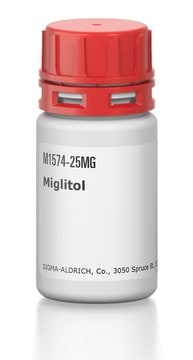MAK123
α-Glucosidase Activity Assay Kit
sufficient for 100 colorimetric tests
Synonym(s):
α-Glucosidase Test Kit
Sign Into View Organizational & Contract Pricing
All Photos(1)
About This Item
UNSPSC Code:
12161503
NACRES:
NA.84
Recommended Products
usage
sufficient for 100 colorimetric tests
detection method
colorimetric
relevant disease(s)
endocrinological disorders, diabetes; neurological disorders
storage temp.
−20°C
Gene Information
human ... GAA(2548)
mouse ... GAA(14387)
rat ... GAA(367562)
General description
α-Glucosidase hydrolyzes carbohydrates by acting on terminal, non-reducing a(1→4)-linked D-glucose residues with the release of D-glucose. Defects in α-glucosidase have been implicated in Pompe disease and diabetes.
Application
α-Glucosidase Activity Assay Kit has been used to measure the activity of a-glucosidase.
Features and Benefits
Compatible with high-throughput handling systems.
Suitability
Suitable for the detection of α-glucosidase activity in biological samples.
Principle
In this assay,α-glucosidase activity is determined by a reaction in which α-glucosidase hydrolyzes p-nitrophenyl-α-D-glucopyranoside resulting in the formation of a colorimetric (405 nm) product, proportional to the α-glucosidase activity present
Storage Class Code
10 - Combustible liquids
Certificates of Analysis (COA)
Search for Certificates of Analysis (COA) by entering the products Lot/Batch Number. Lot and Batch Numbers can be found on a product’s label following the words ‘Lot’ or ‘Batch’.
Already Own This Product?
Find documentation for the products that you have recently purchased in the Document Library.
Customers Also Viewed
Inhibitory effect of rhubarb on intestinal a-glucosidase activity in type 1 diabetic rats.
Hou K J, et al.
Tropical Journal of Pharmaceutical Research, 16(6), 1293-1297 (2017)
Atta-ur-Rahman.
Studies in Natural Products Chemistry, Volume 37 (2017)
Structure of human lysosomal acid a-glucosidase?a guide for the treatment of Pompe disease.
Veronique R Z, et al.
Nature Communications, 8(1), 1111-1111 (2017)
Youngse Oh et al.
Molecules (Basel, Switzerland), 26(2) (2021-01-16)
Catalpa pod has been used in traditional medicine for the treatment of diabetes mellitus in South America. Studies on the constituents of Catalpa species have shown that it is rich in iridoids. In the present study, three previously undescribed compounds
Epigallocatechin gallate affects glucose metabolism and increases fitness and lifespan in Drosophila melanogaster.
Wagner A E, et al.
Oncotarget, 6(31), 30568-30568 (2015)
Our team of scientists has experience in all areas of research including Life Science, Material Science, Chemical Synthesis, Chromatography, Analytical and many others.
Contact Technical Service







